Contemporary Management Capabilities
VerifiedAdded on 2023/03/31
|8
|1610
|199
AI Summary
This report discusses the concept of management and the capabilities required for managing business organizations. It explores work ethics, servant orientation, communication, leadership, resilience, and critical thinking. The report reflects on the relevance of these concepts in the management of business practices and their importance for future career development.
Contribute Materials
Your contribution can guide someone’s learning journey. Share your
documents today.
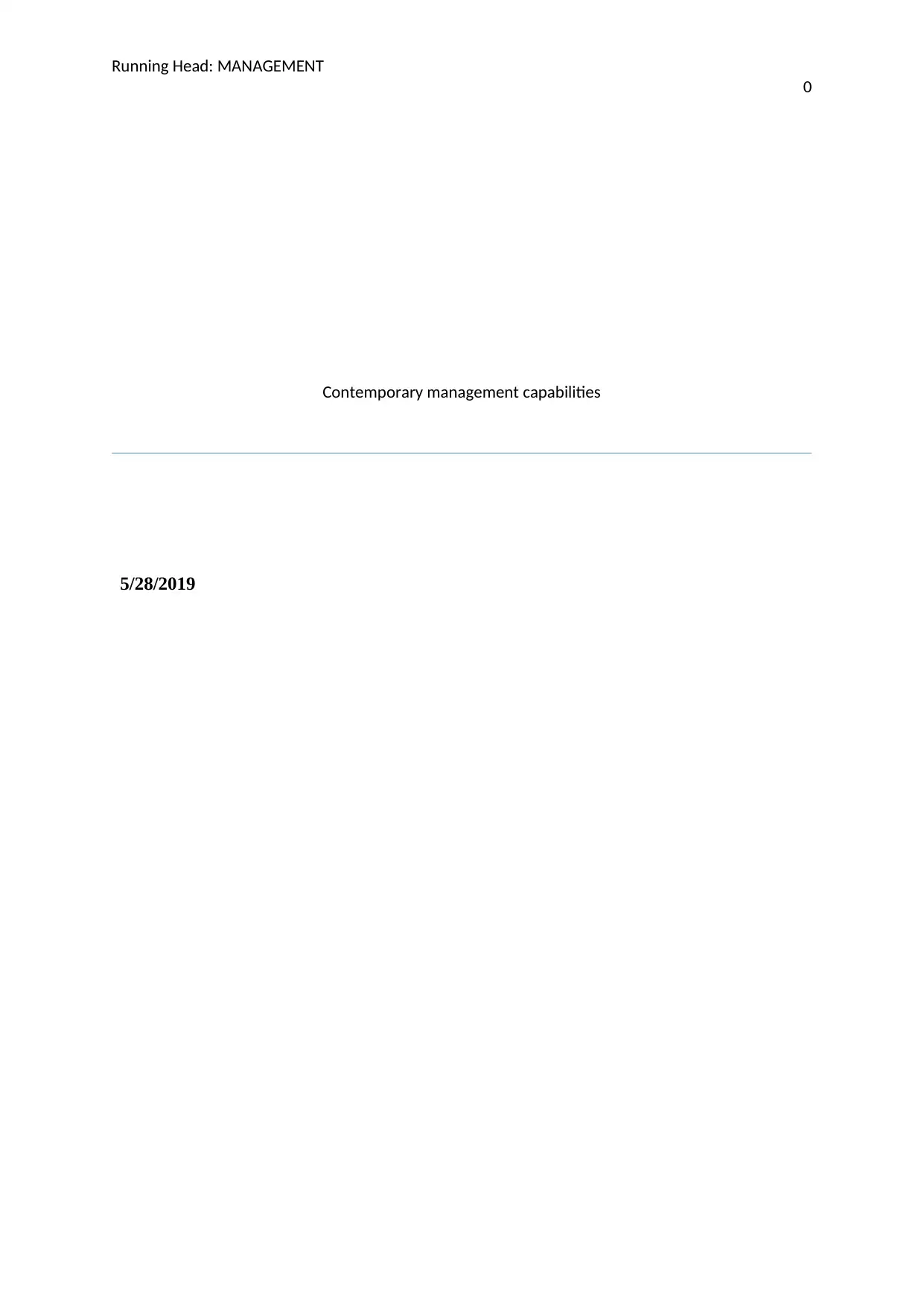
Running Head: MANAGEMENT
0
Contemporary management capabilities
5/28/2019
0
Contemporary management capabilities
5/28/2019
Secure Best Marks with AI Grader
Need help grading? Try our AI Grader for instant feedback on your assignments.
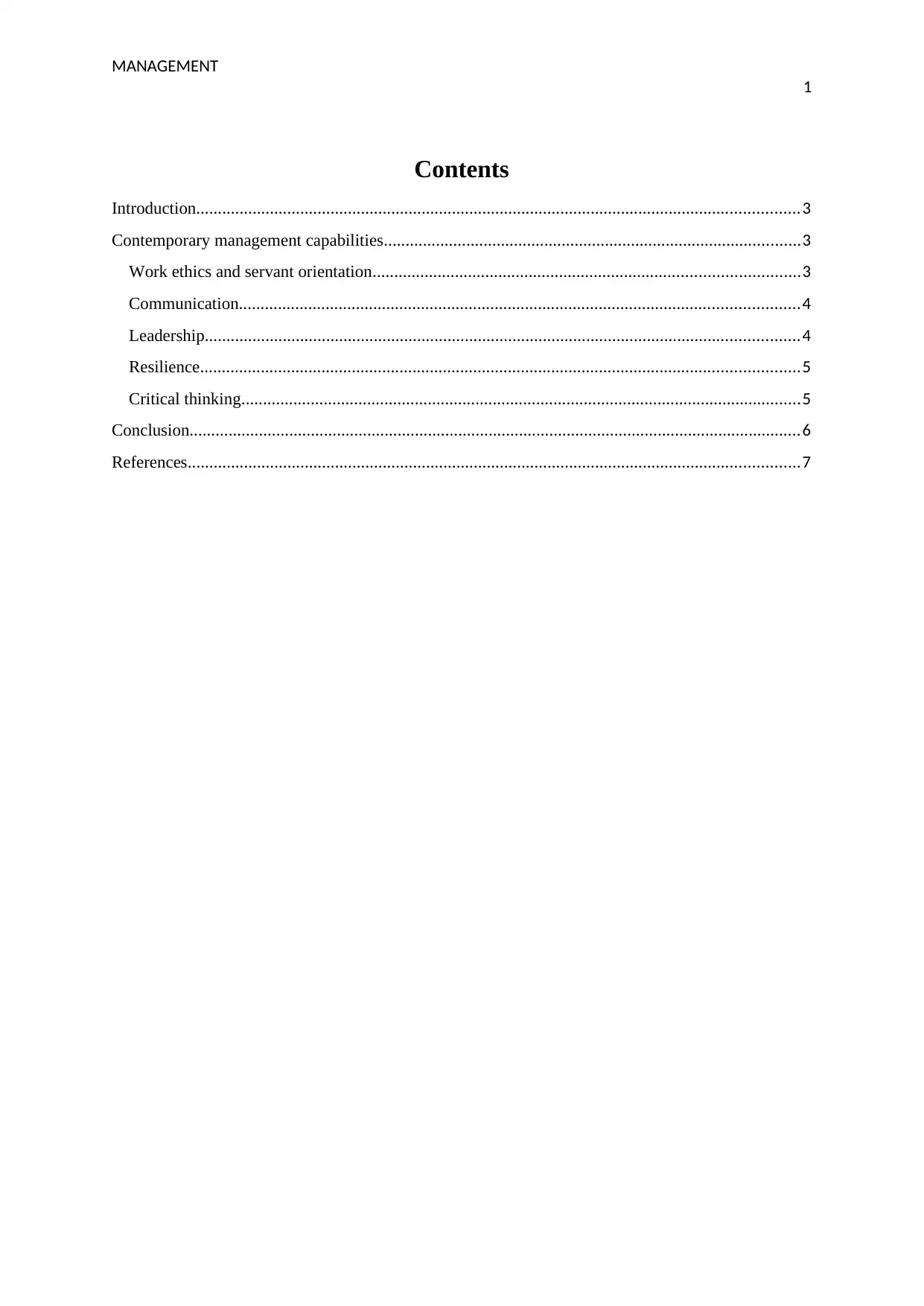
MANAGEMENT
1
Contents
Introduction...........................................................................................................................................3
Contemporary management capabilities................................................................................................3
Work ethics and servant orientation..................................................................................................3
Communication.................................................................................................................................4
Leadership.........................................................................................................................................4
Resilience..........................................................................................................................................5
Critical thinking.................................................................................................................................5
Conclusion.............................................................................................................................................6
References.............................................................................................................................................7
1
Contents
Introduction...........................................................................................................................................3
Contemporary management capabilities................................................................................................3
Work ethics and servant orientation..................................................................................................3
Communication.................................................................................................................................4
Leadership.........................................................................................................................................4
Resilience..........................................................................................................................................5
Critical thinking.................................................................................................................................5
Conclusion.............................................................................................................................................6
References.............................................................................................................................................7
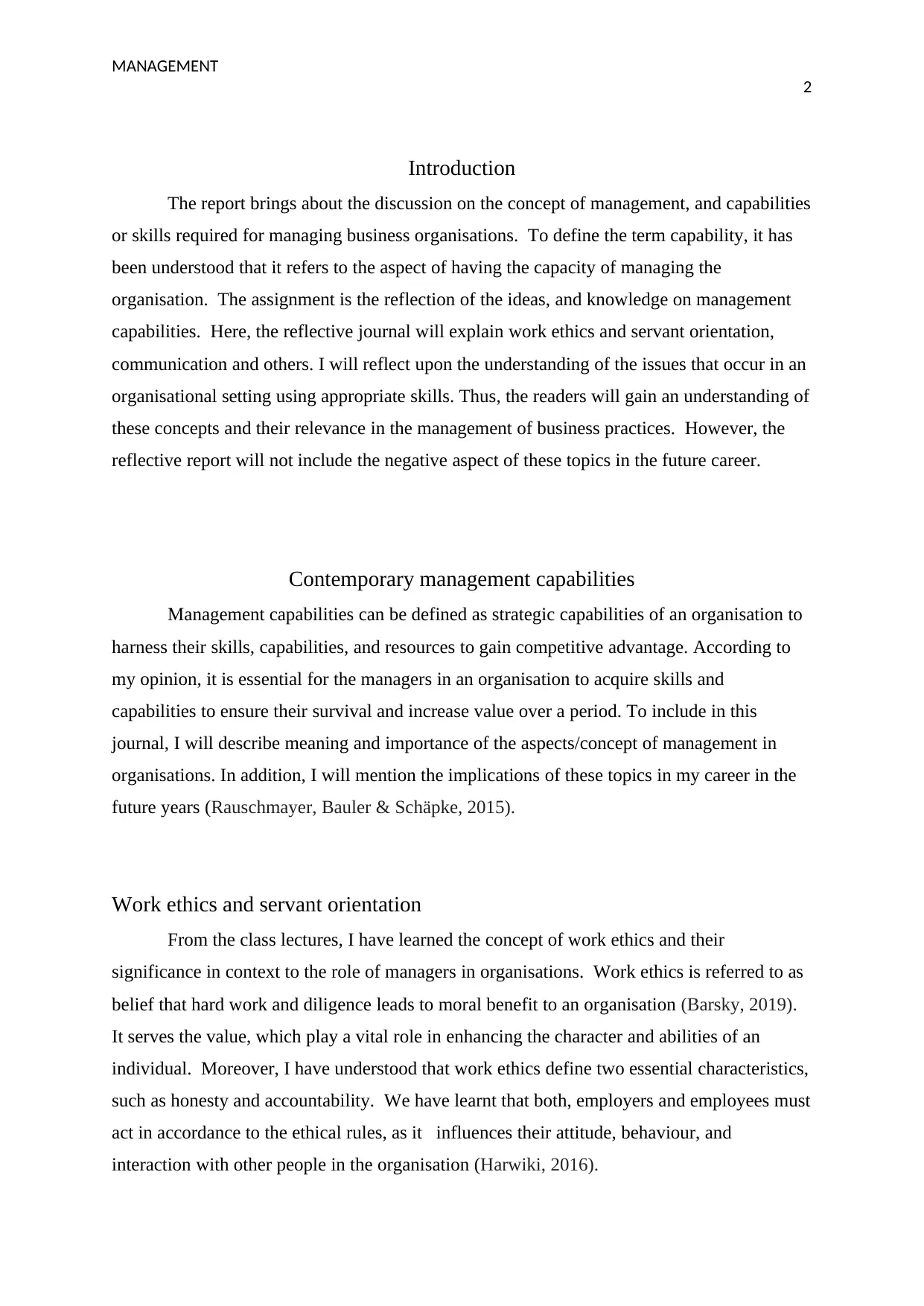
MANAGEMENT
2
Introduction
The report brings about the discussion on the concept of management, and capabilities
or skills required for managing business organisations. To define the term capability, it has
been understood that it refers to the aspect of having the capacity of managing the
organisation. The assignment is the reflection of the ideas, and knowledge on management
capabilities. Here, the reflective journal will explain work ethics and servant orientation,
communication and others. I will reflect upon the understanding of the issues that occur in an
organisational setting using appropriate skills. Thus, the readers will gain an understanding of
these concepts and their relevance in the management of business practices. However, the
reflective report will not include the negative aspect of these topics in the future career.
Contemporary management capabilities
Management capabilities can be defined as strategic capabilities of an organisation to
harness their skills, capabilities, and resources to gain competitive advantage. According to
my opinion, it is essential for the managers in an organisation to acquire skills and
capabilities to ensure their survival and increase value over a period. To include in this
journal, I will describe meaning and importance of the aspects/concept of management in
organisations. In addition, I will mention the implications of these topics in my career in the
future years (Rauschmayer, Bauler & Schäpke, 2015).
Work ethics and servant orientation
From the class lectures, I have learned the concept of work ethics and their
significance in context to the role of managers in organisations. Work ethics is referred to as
belief that hard work and diligence leads to moral benefit to an organisation (Barsky, 2019).
It serves the value, which play a vital role in enhancing the character and abilities of an
individual. Moreover, I have understood that work ethics define two essential characteristics,
such as honesty and accountability. We have learnt that both, employers and employees must
act in accordance to the ethical rules, as it influences their attitude, behaviour, and
interaction with other people in the organisation (Harwiki, 2016).
2
Introduction
The report brings about the discussion on the concept of management, and capabilities
or skills required for managing business organisations. To define the term capability, it has
been understood that it refers to the aspect of having the capacity of managing the
organisation. The assignment is the reflection of the ideas, and knowledge on management
capabilities. Here, the reflective journal will explain work ethics and servant orientation,
communication and others. I will reflect upon the understanding of the issues that occur in an
organisational setting using appropriate skills. Thus, the readers will gain an understanding of
these concepts and their relevance in the management of business practices. However, the
reflective report will not include the negative aspect of these topics in the future career.
Contemporary management capabilities
Management capabilities can be defined as strategic capabilities of an organisation to
harness their skills, capabilities, and resources to gain competitive advantage. According to
my opinion, it is essential for the managers in an organisation to acquire skills and
capabilities to ensure their survival and increase value over a period. To include in this
journal, I will describe meaning and importance of the aspects/concept of management in
organisations. In addition, I will mention the implications of these topics in my career in the
future years (Rauschmayer, Bauler & Schäpke, 2015).
Work ethics and servant orientation
From the class lectures, I have learned the concept of work ethics and their
significance in context to the role of managers in organisations. Work ethics is referred to as
belief that hard work and diligence leads to moral benefit to an organisation (Barsky, 2019).
It serves the value, which play a vital role in enhancing the character and abilities of an
individual. Moreover, I have understood that work ethics define two essential characteristics,
such as honesty and accountability. We have learnt that both, employers and employees must
act in accordance to the ethical rules, as it influences their attitude, behaviour, and
interaction with other people in the organisation (Harwiki, 2016).
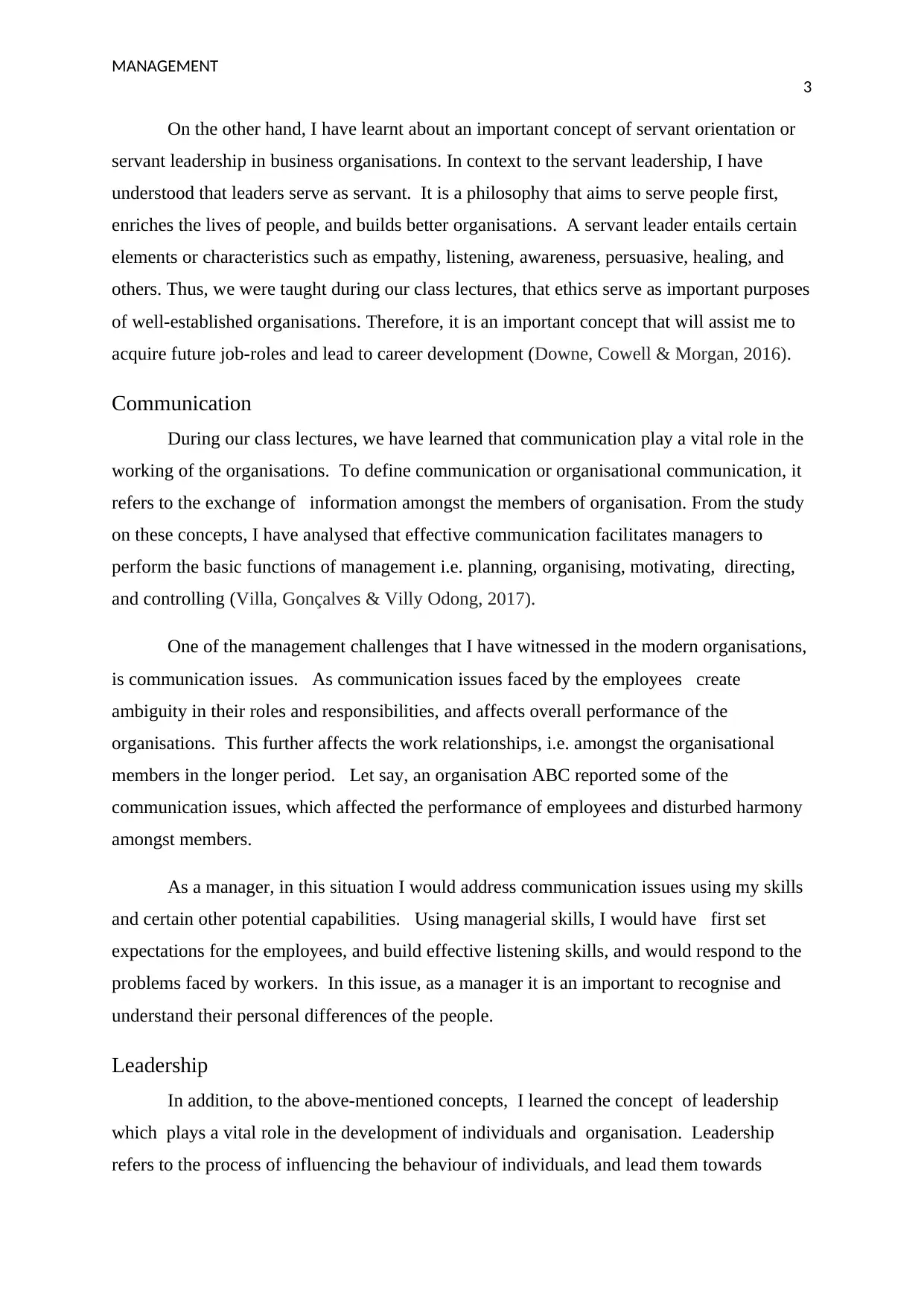
MANAGEMENT
3
On the other hand, I have learnt about an important concept of servant orientation or
servant leadership in business organisations. In context to the servant leadership, I have
understood that leaders serve as servant. It is a philosophy that aims to serve people first,
enriches the lives of people, and builds better organisations. A servant leader entails certain
elements or characteristics such as empathy, listening, awareness, persuasive, healing, and
others. Thus, we were taught during our class lectures, that ethics serve as important purposes
of well-established organisations. Therefore, it is an important concept that will assist me to
acquire future job-roles and lead to career development (Downe, Cowell & Morgan, 2016).
Communication
During our class lectures, we have learned that communication play a vital role in the
working of the organisations. To define communication or organisational communication, it
refers to the exchange of information amongst the members of organisation. From the study
on these concepts, I have analysed that effective communication facilitates managers to
perform the basic functions of management i.e. planning, organising, motivating, directing,
and controlling (Villa, Gonçalves & Villy Odong, 2017).
One of the management challenges that I have witnessed in the modern organisations,
is communication issues. As communication issues faced by the employees create
ambiguity in their roles and responsibilities, and affects overall performance of the
organisations. This further affects the work relationships, i.e. amongst the organisational
members in the longer period. Let say, an organisation ABC reported some of the
communication issues, which affected the performance of employees and disturbed harmony
amongst members.
As a manager, in this situation I would address communication issues using my skills
and certain other potential capabilities. Using managerial skills, I would have first set
expectations for the employees, and build effective listening skills, and would respond to the
problems faced by workers. In this issue, as a manager it is an important to recognise and
understand their personal differences of the people.
Leadership
In addition, to the above-mentioned concepts, I learned the concept of leadership
which plays a vital role in the development of individuals and organisation. Leadership
refers to the process of influencing the behaviour of individuals, and lead them towards
3
On the other hand, I have learnt about an important concept of servant orientation or
servant leadership in business organisations. In context to the servant leadership, I have
understood that leaders serve as servant. It is a philosophy that aims to serve people first,
enriches the lives of people, and builds better organisations. A servant leader entails certain
elements or characteristics such as empathy, listening, awareness, persuasive, healing, and
others. Thus, we were taught during our class lectures, that ethics serve as important purposes
of well-established organisations. Therefore, it is an important concept that will assist me to
acquire future job-roles and lead to career development (Downe, Cowell & Morgan, 2016).
Communication
During our class lectures, we have learned that communication play a vital role in the
working of the organisations. To define communication or organisational communication, it
refers to the exchange of information amongst the members of organisation. From the study
on these concepts, I have analysed that effective communication facilitates managers to
perform the basic functions of management i.e. planning, organising, motivating, directing,
and controlling (Villa, Gonçalves & Villy Odong, 2017).
One of the management challenges that I have witnessed in the modern organisations,
is communication issues. As communication issues faced by the employees create
ambiguity in their roles and responsibilities, and affects overall performance of the
organisations. This further affects the work relationships, i.e. amongst the organisational
members in the longer period. Let say, an organisation ABC reported some of the
communication issues, which affected the performance of employees and disturbed harmony
amongst members.
As a manager, in this situation I would address communication issues using my skills
and certain other potential capabilities. Using managerial skills, I would have first set
expectations for the employees, and build effective listening skills, and would respond to the
problems faced by workers. In this issue, as a manager it is an important to recognise and
understand their personal differences of the people.
Leadership
In addition, to the above-mentioned concepts, I learned the concept of leadership
which plays a vital role in the development of individuals and organisation. Leadership
refers to the process of influencing the behaviour of individuals, and lead them towards
Secure Best Marks with AI Grader
Need help grading? Try our AI Grader for instant feedback on your assignments.
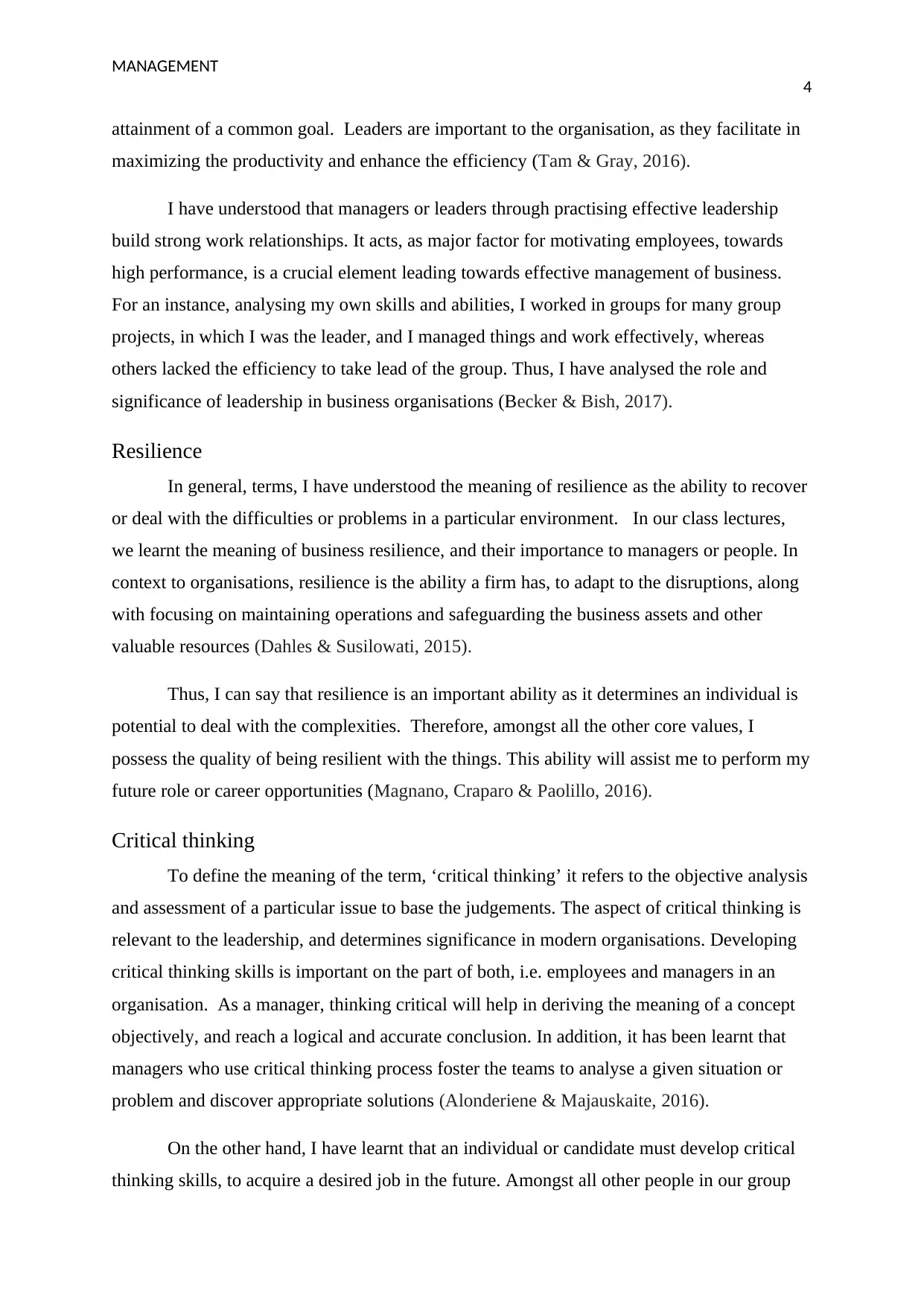
MANAGEMENT
4
attainment of a common goal. Leaders are important to the organisation, as they facilitate in
maximizing the productivity and enhance the efficiency (Tam & Gray, 2016).
I have understood that managers or leaders through practising effective leadership
build strong work relationships. It acts, as major factor for motivating employees, towards
high performance, is a crucial element leading towards effective management of business.
For an instance, analysing my own skills and abilities, I worked in groups for many group
projects, in which I was the leader, and I managed things and work effectively, whereas
others lacked the efficiency to take lead of the group. Thus, I have analysed the role and
significance of leadership in business organisations (Becker & Bish, 2017).
Resilience
In general, terms, I have understood the meaning of resilience as the ability to recover
or deal with the difficulties or problems in a particular environment. In our class lectures,
we learnt the meaning of business resilience, and their importance to managers or people. In
context to organisations, resilience is the ability a firm has, to adapt to the disruptions, along
with focusing on maintaining operations and safeguarding the business assets and other
valuable resources (Dahles & Susilowati, 2015).
Thus, I can say that resilience is an important ability as it determines an individual is
potential to deal with the complexities. Therefore, amongst all the other core values, I
possess the quality of being resilient with the things. This ability will assist me to perform my
future role or career opportunities (Magnano, Craparo & Paolillo, 2016).
Critical thinking
To define the meaning of the term, ‘critical thinking’ it refers to the objective analysis
and assessment of a particular issue to base the judgements. The aspect of critical thinking is
relevant to the leadership, and determines significance in modern organisations. Developing
critical thinking skills is important on the part of both, i.e. employees and managers in an
organisation. As a manager, thinking critical will help in deriving the meaning of a concept
objectively, and reach a logical and accurate conclusion. In addition, it has been learnt that
managers who use critical thinking process foster the teams to analyse a given situation or
problem and discover appropriate solutions (Alonderiene & Majauskaite, 2016).
On the other hand, I have learnt that an individual or candidate must develop critical
thinking skills, to acquire a desired job in the future. Amongst all other people in our group
4
attainment of a common goal. Leaders are important to the organisation, as they facilitate in
maximizing the productivity and enhance the efficiency (Tam & Gray, 2016).
I have understood that managers or leaders through practising effective leadership
build strong work relationships. It acts, as major factor for motivating employees, towards
high performance, is a crucial element leading towards effective management of business.
For an instance, analysing my own skills and abilities, I worked in groups for many group
projects, in which I was the leader, and I managed things and work effectively, whereas
others lacked the efficiency to take lead of the group. Thus, I have analysed the role and
significance of leadership in business organisations (Becker & Bish, 2017).
Resilience
In general, terms, I have understood the meaning of resilience as the ability to recover
or deal with the difficulties or problems in a particular environment. In our class lectures,
we learnt the meaning of business resilience, and their importance to managers or people. In
context to organisations, resilience is the ability a firm has, to adapt to the disruptions, along
with focusing on maintaining operations and safeguarding the business assets and other
valuable resources (Dahles & Susilowati, 2015).
Thus, I can say that resilience is an important ability as it determines an individual is
potential to deal with the complexities. Therefore, amongst all the other core values, I
possess the quality of being resilient with the things. This ability will assist me to perform my
future role or career opportunities (Magnano, Craparo & Paolillo, 2016).
Critical thinking
To define the meaning of the term, ‘critical thinking’ it refers to the objective analysis
and assessment of a particular issue to base the judgements. The aspect of critical thinking is
relevant to the leadership, and determines significance in modern organisations. Developing
critical thinking skills is important on the part of both, i.e. employees and managers in an
organisation. As a manager, thinking critical will help in deriving the meaning of a concept
objectively, and reach a logical and accurate conclusion. In addition, it has been learnt that
managers who use critical thinking process foster the teams to analyse a given situation or
problem and discover appropriate solutions (Alonderiene & Majauskaite, 2016).
On the other hand, I have learnt that an individual or candidate must develop critical
thinking skills, to acquire a desired job in the future. Amongst all other people in our group
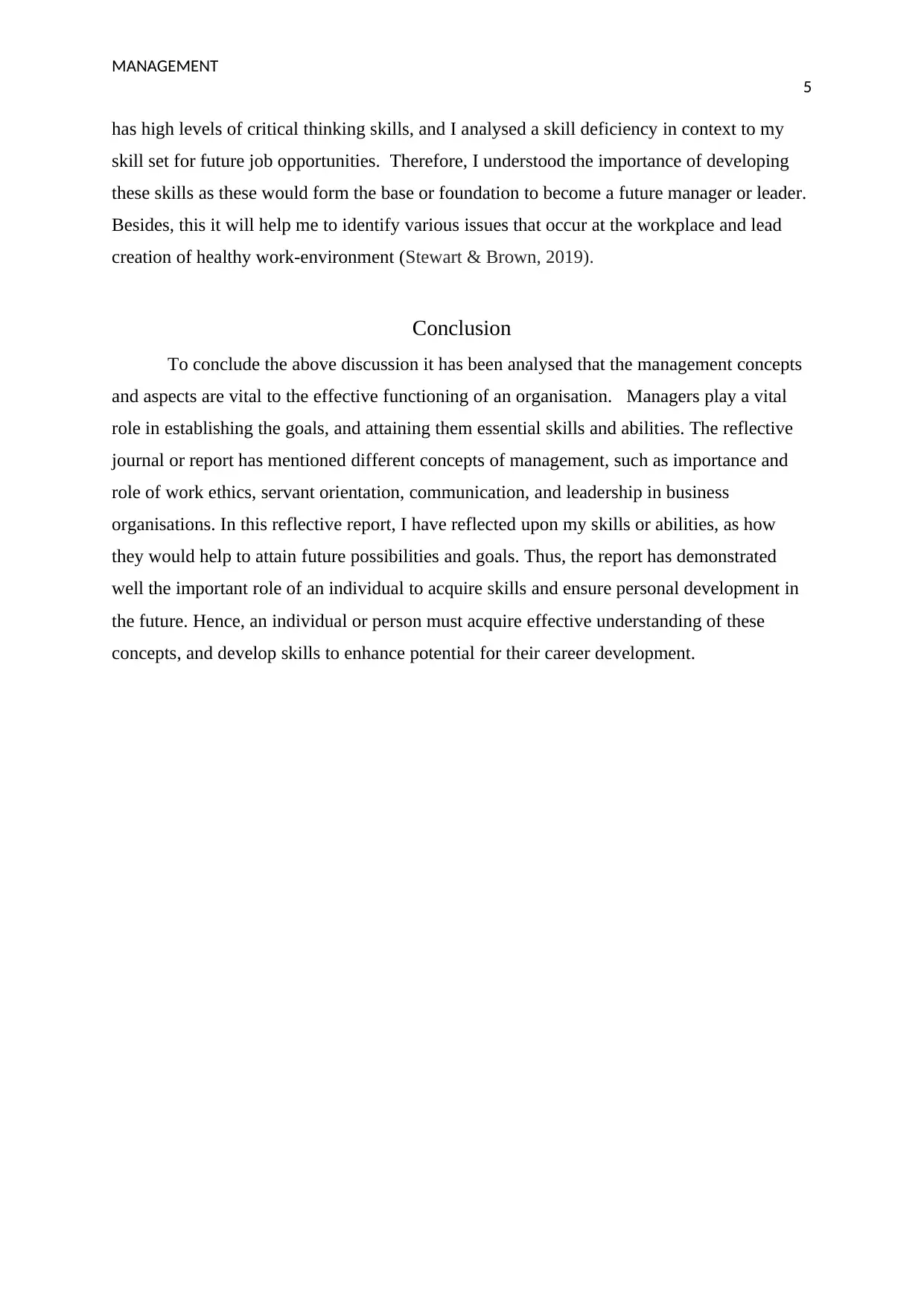
MANAGEMENT
5
has high levels of critical thinking skills, and I analysed a skill deficiency in context to my
skill set for future job opportunities. Therefore, I understood the importance of developing
these skills as these would form the base or foundation to become a future manager or leader.
Besides, this it will help me to identify various issues that occur at the workplace and lead
creation of healthy work-environment (Stewart & Brown, 2019).
Conclusion
To conclude the above discussion it has been analysed that the management concepts
and aspects are vital to the effective functioning of an organisation. Managers play a vital
role in establishing the goals, and attaining them essential skills and abilities. The reflective
journal or report has mentioned different concepts of management, such as importance and
role of work ethics, servant orientation, communication, and leadership in business
organisations. In this reflective report, I have reflected upon my skills or abilities, as how
they would help to attain future possibilities and goals. Thus, the report has demonstrated
well the important role of an individual to acquire skills and ensure personal development in
the future. Hence, an individual or person must acquire effective understanding of these
concepts, and develop skills to enhance potential for their career development.
5
has high levels of critical thinking skills, and I analysed a skill deficiency in context to my
skill set for future job opportunities. Therefore, I understood the importance of developing
these skills as these would form the base or foundation to become a future manager or leader.
Besides, this it will help me to identify various issues that occur at the workplace and lead
creation of healthy work-environment (Stewart & Brown, 2019).
Conclusion
To conclude the above discussion it has been analysed that the management concepts
and aspects are vital to the effective functioning of an organisation. Managers play a vital
role in establishing the goals, and attaining them essential skills and abilities. The reflective
journal or report has mentioned different concepts of management, such as importance and
role of work ethics, servant orientation, communication, and leadership in business
organisations. In this reflective report, I have reflected upon my skills or abilities, as how
they would help to attain future possibilities and goals. Thus, the report has demonstrated
well the important role of an individual to acquire skills and ensure personal development in
the future. Hence, an individual or person must acquire effective understanding of these
concepts, and develop skills to enhance potential for their career development.
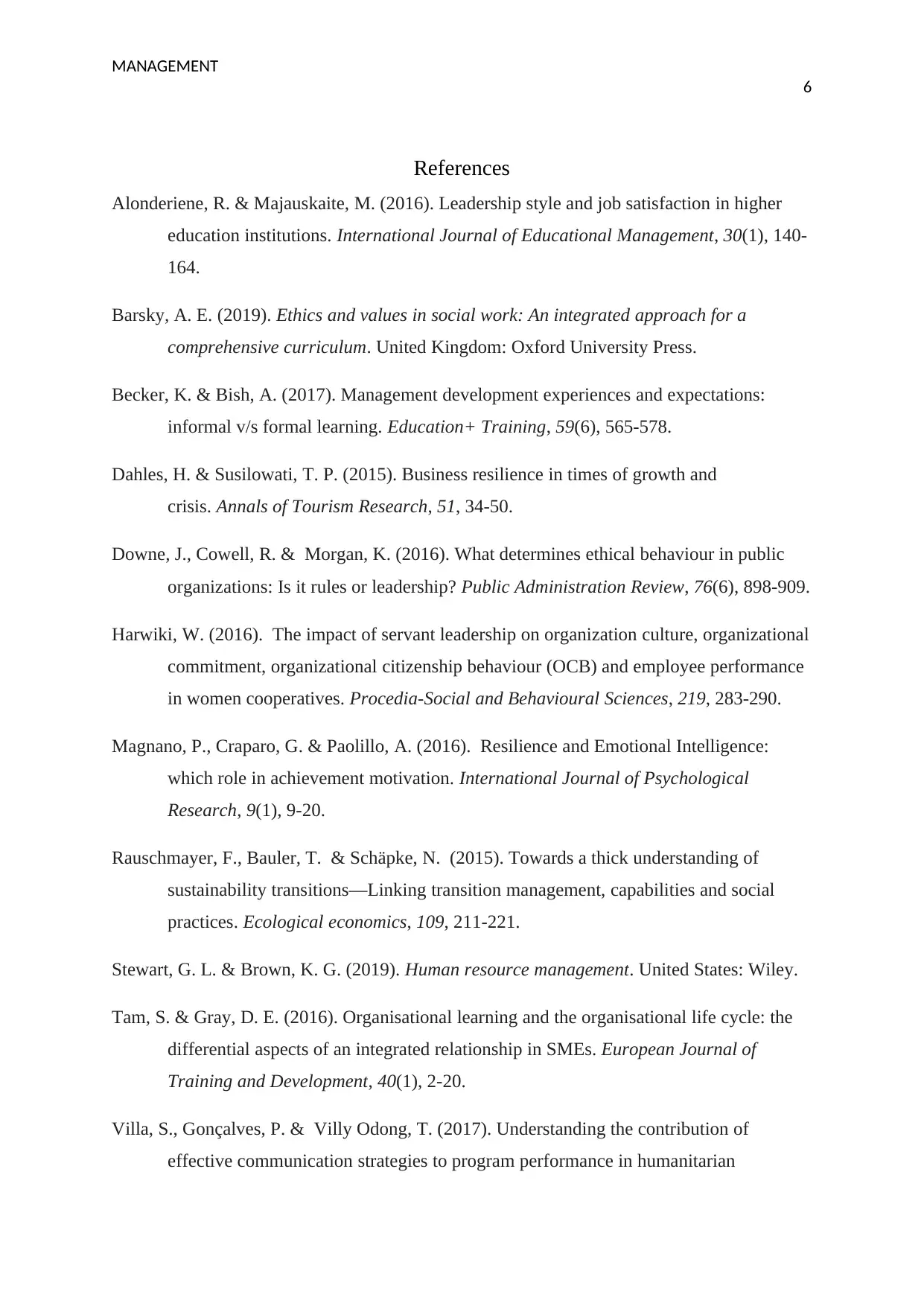
MANAGEMENT
6
References
Alonderiene, R. & Majauskaite, M. (2016). Leadership style and job satisfaction in higher
education institutions. International Journal of Educational Management, 30(1), 140-
164.
Barsky, A. E. (2019). Ethics and values in social work: An integrated approach for a
comprehensive curriculum. United Kingdom: Oxford University Press.
Becker, K. & Bish, A. (2017). Management development experiences and expectations:
informal v/s formal learning. Education+ Training, 59(6), 565-578.
Dahles, H. & Susilowati, T. P. (2015). Business resilience in times of growth and
crisis. Annals of Tourism Research, 51, 34-50.
Downe, J., Cowell, R. & Morgan, K. (2016). What determines ethical behaviour in public
organizations: Is it rules or leadership? Public Administration Review, 76(6), 898-909.
Harwiki, W. (2016). The impact of servant leadership on organization culture, organizational
commitment, organizational citizenship behaviour (OCB) and employee performance
in women cooperatives. Procedia-Social and Behavioural Sciences, 219, 283-290.
Magnano, P., Craparo, G. & Paolillo, A. (2016). Resilience and Emotional Intelligence:
which role in achievement motivation. International Journal of Psychological
Research, 9(1), 9-20.
Rauschmayer, F., Bauler, T. & Schäpke, N. (2015). Towards a thick understanding of
sustainability transitions—Linking transition management, capabilities and social
practices. Ecological economics, 109, 211-221.
Stewart, G. L. & Brown, K. G. (2019). Human resource management. United States: Wiley.
Tam, S. & Gray, D. E. (2016). Organisational learning and the organisational life cycle: the
differential aspects of an integrated relationship in SMEs. European Journal of
Training and Development, 40(1), 2-20.
Villa, S., Gonçalves, P. & Villy Odong, T. (2017). Understanding the contribution of
effective communication strategies to program performance in humanitarian
6
References
Alonderiene, R. & Majauskaite, M. (2016). Leadership style and job satisfaction in higher
education institutions. International Journal of Educational Management, 30(1), 140-
164.
Barsky, A. E. (2019). Ethics and values in social work: An integrated approach for a
comprehensive curriculum. United Kingdom: Oxford University Press.
Becker, K. & Bish, A. (2017). Management development experiences and expectations:
informal v/s formal learning. Education+ Training, 59(6), 565-578.
Dahles, H. & Susilowati, T. P. (2015). Business resilience in times of growth and
crisis. Annals of Tourism Research, 51, 34-50.
Downe, J., Cowell, R. & Morgan, K. (2016). What determines ethical behaviour in public
organizations: Is it rules or leadership? Public Administration Review, 76(6), 898-909.
Harwiki, W. (2016). The impact of servant leadership on organization culture, organizational
commitment, organizational citizenship behaviour (OCB) and employee performance
in women cooperatives. Procedia-Social and Behavioural Sciences, 219, 283-290.
Magnano, P., Craparo, G. & Paolillo, A. (2016). Resilience and Emotional Intelligence:
which role in achievement motivation. International Journal of Psychological
Research, 9(1), 9-20.
Rauschmayer, F., Bauler, T. & Schäpke, N. (2015). Towards a thick understanding of
sustainability transitions—Linking transition management, capabilities and social
practices. Ecological economics, 109, 211-221.
Stewart, G. L. & Brown, K. G. (2019). Human resource management. United States: Wiley.
Tam, S. & Gray, D. E. (2016). Organisational learning and the organisational life cycle: the
differential aspects of an integrated relationship in SMEs. European Journal of
Training and Development, 40(1), 2-20.
Villa, S., Gonçalves, P. & Villy Odong, T. (2017). Understanding the contribution of
effective communication strategies to program performance in humanitarian
Paraphrase This Document
Need a fresh take? Get an instant paraphrase of this document with our AI Paraphraser
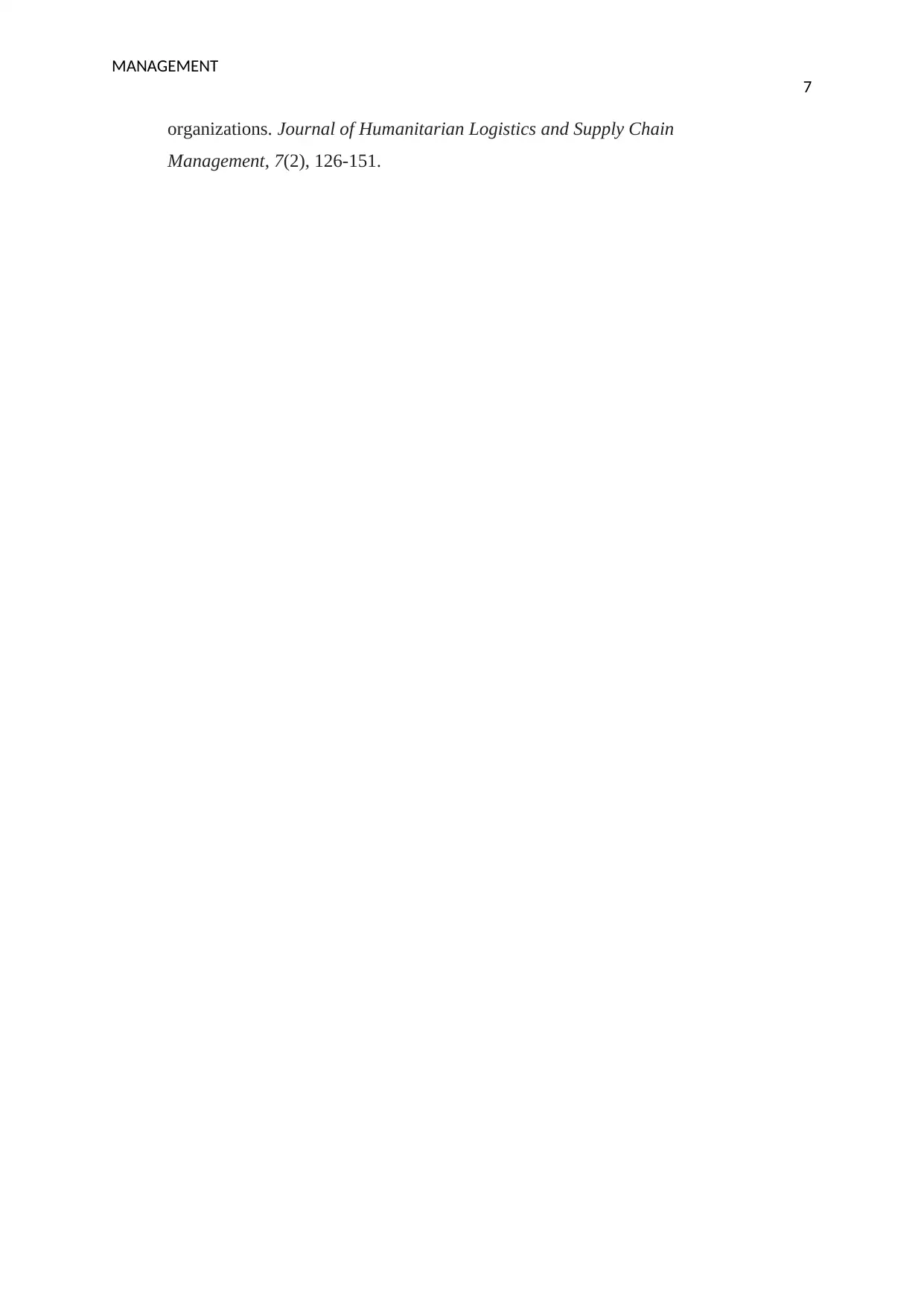
MANAGEMENT
7
organizations. Journal of Humanitarian Logistics and Supply Chain
Management, 7(2), 126-151.
7
organizations. Journal of Humanitarian Logistics and Supply Chain
Management, 7(2), 126-151.
1 out of 8
Related Documents
Your All-in-One AI-Powered Toolkit for Academic Success.
+13062052269
info@desklib.com
Available 24*7 on WhatsApp / Email
![[object Object]](/_next/static/media/star-bottom.7253800d.svg)
Unlock your academic potential
© 2024 | Zucol Services PVT LTD | All rights reserved.





